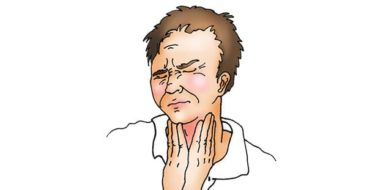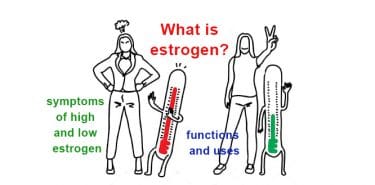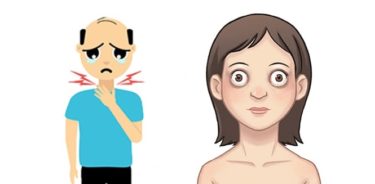Hypothyroidism is a health condition developing due to insufficient production of thyroid hormone by the thyroid gland in the body. This hormone secreted by the thyroid gland controls the functioning speed of metabolism. Therefore, patients experience symptoms regarding slow metabolism such as fatigue, constipation, dry skin and hair, joint and muscle aches, cold tenderness and depressed mood. A physical examination, symptom evaluation and a blood test that measures your hormone levels are required to diagnose hypothyroidism. The treatment of the disease is performed taking synthetic thyroid hormone daily. The treatment is simple, safe and effective when a correct dose is administered.
Table of Contents
What is hypothyroidism?
The thyroid is a butterfly-shaped endocrine gland located just above the collarbone in the neck. It produces thyroid hormones that control the speed of many activities in the body. Thyroid hormones control all metabolism activities, such as heart rate, convertion rate of foods into energy in the body.
If the thyroid gland is not active enough, it cannot produce thyroid hormones which is sufficient for the body. This condition is called hypothyroidism. It is more common in women, people with different thyroid problems and those over the age of 50. (1)
Causes of hypothyroidism
- Autoimmune diseases: The most common cause of hypothyroidism is Hashimoto’s thyroiditis. Autoimmune disorders occur when our immune system produces antibodies that attack our own body tissues. These antibodies affect the ability of the thyroid gland to produce hormones. Autoimmune thyroiditis may start suddenly or develop slowly over the years.
- Hyperthyroidism treatment: In some cases, the body may react to hyperthyroidism (high level of thyroid hormone) treatment. The production of thyroid hormone may be excessively reduced. Therefore, permanent hypothyroidism may develop.
- Thyroid surgery: Excision of the thyroid gland completely or partially may reduce the production of the hormone or cease it.
- Radiation treatment: Patients with Graves’ disease, nodular goiter or thyroid cancer are treated with radioactive iot (I-131). Those with Hodgkin disease, lymphoma, head or neck cancer, on the other hand, are treated with radiation. Patients may lose some or all of the thyroid functions due to the side effects of these treatments.

- Congenital (natal) hypothyroidism: It is the type of hypothyroidism observed in infants without the thyroid gland or born with thyroid development disorder. It occurs when enzymes do not work properly.
- Medicines: Medicines such as amiodarone, lithium, interferon alpha, and interleukin-2 may adversely affect the level of hormone production in the thyroid gland. In people who have a genetic predisposition to autoimmune thyroid disease, these medicines are more likely to trigger hypothyroidism. (2)
- Inflammation of the thyroid gland (Thyroiditis): Thyroiditis is the inflammation of the thyroid gland usually caused by an autoimmune attack or viral infection. Thyroiditis causes all stored thyroid hormone to be secreted into the blood at once. The period of hypothyroidism following this excessive activity can turn into permanent.
Thyroid hormones and functions
The thyroid gland serves to produce thyroid hormones that help regulate metabolism. These hormones are called triiodothyronine (T3) and thyroxine (T4). Thyroid hormones help the body use energy, maintain the body temperature and keep the brain, heart, muscles and other organs functioning properly.
The pituitary gland located in the lower part of the brain controls the thyroid function by producing TSH (thyroid stimulating hormone). TSH is the hormone that stimulates the thyroid gland to produce T3 and T4 hormones. The thyroid gland produces more T4. The body can convert T4 to T3 if needed.
Symptoms of hypothyroidism
- Fatigue and weakness
- Weight gain or difficulty in losing weight
- Thinning, drying and shedding of hair
- Dry skin
- Cold intolerance (impatience for cold)
- Frequent muscle cramps and pain
- Constipation
- Depression
- Irritability
- Loss of memory
- Abnormal menstrual cycle
- Loss of sexual desire
The reason for all these symptoms is the slowdown of metabolism caused by hypothyroidism. Symptoms such as fatigue, loss of appetite, weight gain and quick chills occur when energy production slows down. Slow metabolism reduces sweating. As a result, dryness of the skin and hair occurs.
When digestion slows, constipation appears. Moreover, the psychological effects of this slowdown in metabolism, such as depression, are also important. It can be seen at different levels in each patient. (3)
Diagnosis of hypothyroidism
Your doctor will learn about your symptoms and medical history. S/he checks whether there is a swelling in the thyroid gland. S/he also looks for changes such as dry skin, slow reflexes and heart rate.
Many symptoms of hypothyroidism are similar to the symptoms of other disease; therefore, doctors cannot diagnose hypothyroidism based on symptoms alone. The only way to be sure whether you have thyroid problems is to have a thyroid test that measures your hormone levels. (4)
Two types of tests for the diagnosis of hypothyroidism:
- TSH (thyroid stimulating hormone) test. It is the most important and sensitive test for hypothyroidism. An extremely high TSH means hypothyroidism.
- T4 tests. T4 tests are simple blood tests that measure how much free T4 is available in the blood to enter the cells.

Types of hypothyroidism
- Primary hypothyroidism: In primary hypothyroidism, the thyroid gland is properly stimulated. However, it cannot produce the required amount of thyroid hormones for your body. The source of the problem in this type of hypothyroidism is the thyroid gland itself. (5)
- Secondary hypothyroidism: The pituitary gland does not stimulatethe thyroid gland to produce enough hormones. The problem is not related to thyroid, but the inability of the pituitary gland to secrete TSH.
- Tertiary hypothyroidism: It is a type of hypothyroidism that develops due to insufficient secretion of thyrotropin-releasing hormone (TRH).
- Central hypothyroidism: It develops when there is a problem in TSH production by the pituitary gland.
- Subclinical hypothyroidism: It occurs due to high level of TSH. The occurence of this type of hypothyroidism varies and classic symptoms of hypothyroidism may not be seen.
- Congenital hypothyroidism: If the thyroid gland is not formed in the womb or partially developed, congenital hypothyroidism develops. In some cases, the reason is that enzymes responsible for the production of thyroid hormone do not work. Hypothyroidism may also occur in the baby due to iodine deficiency of Hashimato’s disease in the mother.
Treatment of hypothyroidism
Hypothyroidism medication
Hypothyroid medication aims to lower TSH level to the mid-range of the normal range and keep it at this level. The treatment is often administered by providing thyroid hormone support to patients. A T4 drug (levothyroxine sodium), taken daily and preferably in the morning, serves the role of thyroid hormones. Thyroid hormones are best absorbed on an empty stomach. (6)
Your doctor will determine your starting dose based on your weight, age and general health. Synthetic T4 hormone offered for use under different brand names is the same in all drugs; however, inactive components of different brands may change. These components may affect the absorption of the drug.
How long does it take to treat hypothyroidism?
If hypothyroidism is permanent, one should take a T4 hormone drug for the rest of his/her life. In many people who take sufficient amount of synthetic T4, the symptoms disappear.
Hypothyroidism and nutrition
Nutrition has 3 main effects on hypothyroidism:
- Foods containing iodine, selenium and zinc support thyroid functions.
- Reducing the intake of some foods that lowers thyroid absorption assists the treatment. Antacids or acid reducers, calcium supplements, iron supplements, highly fibrous foods, iodine-rich foods, and soy can interfere with the absorption of the thyroid hormone by the body.
- It is better for health to follow a diet that prevents weight gain for patients with hypothyroidism as the body metabolism slows down.
Which foods are bad for hypothyroidism?
- Gluten: The possibility that hypothyroidism may trigger other autoimmune diseases should be considered as it can occur in connection with an autoimmune disease. Patients with hypothyroidism may observe whether their symptoms are relieved by removing gluten-containing foods from their diets. Gluten is a protein found in grains, including wheat, barley, oats and rye.
- Guatrogen: Some foods contain guatrogens that can potentially reduce thyroid hormone production. Guatrogenic foods are mostly brassicaceae, such as black cabbage, brussels sprouts, cabbage, broccoli, cauliflower. These vegetables, which have many benefits on health, have negative effects only when consumed excessively. Patients with hypothyroidism can also consume guatrogenic foods, provided they consume at a moderate level.
- Soy: Studies show that foods containing soy may have a negative effect on the production of thyroid hormones. Patients with hypothyroidism should exclude foods containing soy such as soy milk, soy sauce, soybeans and bean curd from their diets.
- Processed foods: Processed, refined and homogenized foods which have high calorie, low nutritional value and accelarate weight gain should be avoided in hypothyroidism. Fastfoods and foods including flour are among this type of foods.
Daily diet of patients with hypothyroidism
Nutrients containing iodine, selenium and zinc are supportive of the treatment in hypothyroidism.
- Iodine: The body needs iodine to produce thyroid hormones. Therefore, a healthy diet should contain iodine. Iodine deficiency may cause the enlargement of the thyroid gland, which is known as goiter. However, excessive iodine intake may worsen hypothyroidism and hyperthyroidism. Foods rich in iodine: Cheese, milk, table salt with iodine, fish and eggs.
- Selenium: Selenium is a mineral that plays a role in the production of thyroid hormones, and has antioxidant activity. Thyroid tissue naturally contains selenium. Consuming selenium-rich foods such as brazil nuts, tuna, shrimp, beef, turkey, chicken, eggs, oats and wheat bread is helpful in the treatment of hypothyroidism. (7)
- Zinc: Another mineral that has positive effects on thyroid hormones is zinc. Including zinc-rich oysters, beef, crabs, pork, chicken, legumes, pumpkin seeds, and yoghurt in your diet will help your symptoms improve.
How can hypothyroid patients lose weight?
The disease should be treated to lose weight in hypothyroidism. With regular use of thyroid hormone drugs, patients also begin to lose weight along with an improvement in hormone levels. Deficiency of thyroid hormone and lacking some minerals prevent weight loss. Manganese, chromium, zinc, calcium and magnesium deficiencies in the body must be filled. Eating more protein also increases your metabolic rate.
Hypothyroidism in pregnancy
Hypothyroidism in pregnancy usually leads to Hashimoto’s disease and occurs in 2 or 3 of every 100 pregnancies. If left untreated, it causes preeclampsia (dangerous increase in blood pressure in late pregnancy), anemia, miscarriage, low birth weight, stillbirth and rarely congestive heart failure.
Thyroid hormones are important for the brain and nervous system development of babies. Untreated hypothyroidism in the first trimester may lead to low IQ and developmental problems in babies.
Risk factors of hypothyroidism in pregnancy
- Previous infertility
- Early childbirth
- History of thyroid or autoimmune disease in family
- Having Type I diabetes
- Having an autoimmune disease
- Receiving head or neck radiotherapy
- Undergoing thyroid surgery
- Having goiter
- Age >30 years
Due to the dangers of untreated thyroid disease, experts recommend thyroid function screening tests for all pregnant women.
Hypothyroidism and goiter
In hypothyroidism, the pituitary gland detects that thyroid hormone level is too low and increases the level of thyroid-stimulating hormone (TSH). TSH stimulates thyroid to produce thyroid hormone, replicates thyroid cells and enlarges the thyroid gland. The enlarged thyroid gland forms a bump that is felt in the front side of the neck, under the skin. When the thyroid gland is large enough to be easily noticed, it is called goiter. Both hypothyroidism and hyperthyroidism can cause goiter.
Depending on the cause, iodine supplement or daily thyroid hormone is used in the treatment. Although goiter decreases with the treatment, it may not recover completely. If goiter is pale and enlarges too much to narrow the esophagus, your doctor may recommend surgical removal.
High level of TSH and hypothyroidism
TSH is a hormone secreted by the pituitary gland located in lower part of brain to control the activity of the thyroid gland. TSH (thyroid stimulating hormone) stimulates the thyroid gland to produce thyroid hormone. TSH level is effective in the production of triiodothyronine (T3) and thyroxine (T4) hormones.
The body expects a certain amount of thyroid hormones that it needs; therefore, TSH, which stimulated thyroid gland to produce more hormones, is produced in high amounts in hypothyroidism. Overfunction of TSH may cause thyroid enlargement, thereby possibly leading to goiter and hypothyroidism. If left untreated, symptoms of the disease usually progress. It rarely causes serious life-threatening depression, heart failure, or coma.




